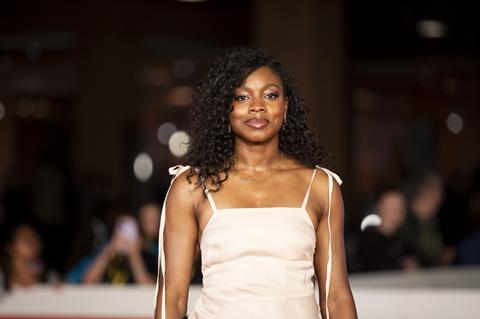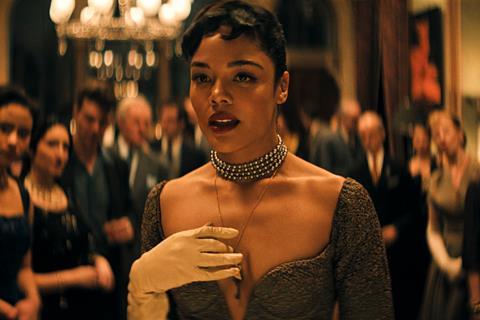
US writer-director Nia DaCosta is attending the Rome Film Festival with her latest film Hedda, an adaptation of Henrik Ibsen’s play which she also produced alongside Dede Gardner, Jeremy Kleiner, Gabrielle Nadig and star Tessa Thompson.
DaCosta and Thompson met at the Sundance Labs while workshopping the script for Little Woods, the film that would go on to become their first collaboration followed by 2023’s The Marvels.
Most recently DaCosta, who also directed Candyman, helmed zombie action thriller 28 Years Later: The Bone Temple for the UK’s DNA Films which Sony will release in early 2026. She shot it back-to-back with Hedda in the UK in 2024.
Ahead of receiving the Rome Film Festival’s progressive lifetime achievement award at the festival Thursday evening, DaCosta talked to Screen about the potential loss to independent cinema in the wake of the death of her former mentor Robert Redford, the difference between making films in the UK and the US, and why she wants a rest – but might not get one.
How does your approach to filmmaking differ between genres?
I try to work from the inside out, inside the story, the characters, and then interrogate it before making specific decisions that are on screen. The conversations are always the same whatever the genre, but what specifics come out are different – sometimes the person needs to be wearing spandex or latex or suede – depending on the genre.
Are the pressures ultimately the same whatever the budget?
The pressures are similar, but the way I metabolise them is quite different. With a film like Hedda, I wrote it, I’m directing it, I produced it. It really feels like mine. The people who are working on it with me acknowledge it as well, which is lovely. When you make things that are bigger or a part of a franchise, you figure out how much you get to put your stamp on it. Sometimes it’s a lot. Sometimes it’s not as much as you’d like.
What does a Nia DaCosta stamp look like?
I’m very specific about tone, the way I see the world. We live in a beautiful world in which terrible things happen. I find that dichotomy interesting. That’s the experience of being alive. And I love a little bit of tension, a little bit humour.
You make films in both the US and the UK. What are the differences?
I’ve been lucky in both places. I have a great crew. The main thing I would say is in the UK we try not to keep people away from their families. It’s a very different energy around what place work should have in your life.
In America, it’s much more like, well, it’s an 18-hour day because it’s an 18-hour day, and my kids will see me at Christmas. They get paid overtime in the US if we go over, which is a good thing.
How did you approach stepping into the world of 28 Years as created by Alex Garland and Danny Boyle?
I was nervous, not because of external pressure but because I wanted to make sure I would be able to make the movie I wanted to make. I’m such a huge fan of 28 Days, and of Alex’s and Danny’s work, I felt pretty confident that no matter what happened the movie would be great at the end.
The best thing that happened was they bought into my vision and believed in what I wanted to do. They let me do it, and helped me make it the best it could be.

What do you think the world of indie filmmaking will look like in five years?
Everything’s changing so quickly. Bob Redford passed away, and he was such a huge part of my career, a mentor to me at the Sundance Labs, and a huge part of independent film. It’s always going to be ups and downs, but I feel people are going to step into that space and continue to foster opportunities and amplify those new voices.
What’s next for you?
I made two movies very close together, and four movies back-to-back. I’m going to take a little bit of a breather. I do have some stuff cooking. I’m writing a new script, which I’m excited about. I’m going to call it a historical epic thriller.
Is there a slight fear that if you step away, you might lose out?
For sure. My team has to remind me ‘don’t worry’ and I have to remind them I have to take a break. We feed into each other the idea of finding time for life outside films. If you just keep producing, you’re not good. If you’re not living, you have nothing to say.















![[L-R]: Amanda Villavieja, Laia Casanovas, Yasmina Praderas](https://d1nslcd7m2225b.cloudfront.net/Pictures/274x183/6/4/1/1471641_pxl_20251224_103354743_618426_crop.jpg)









No comments yet